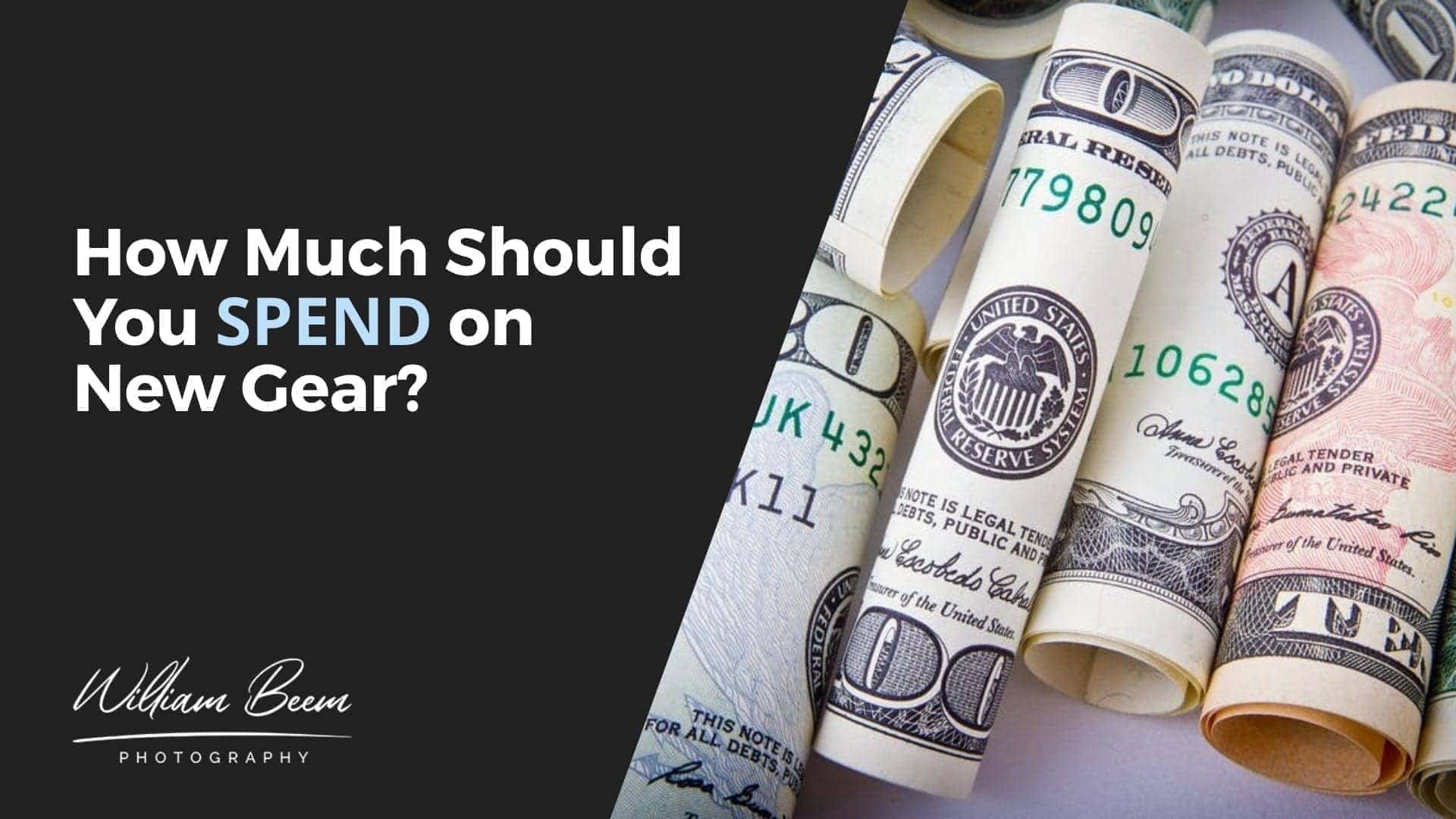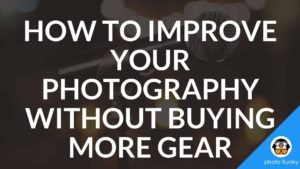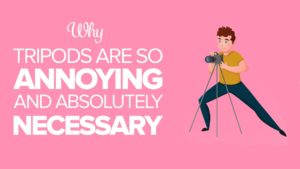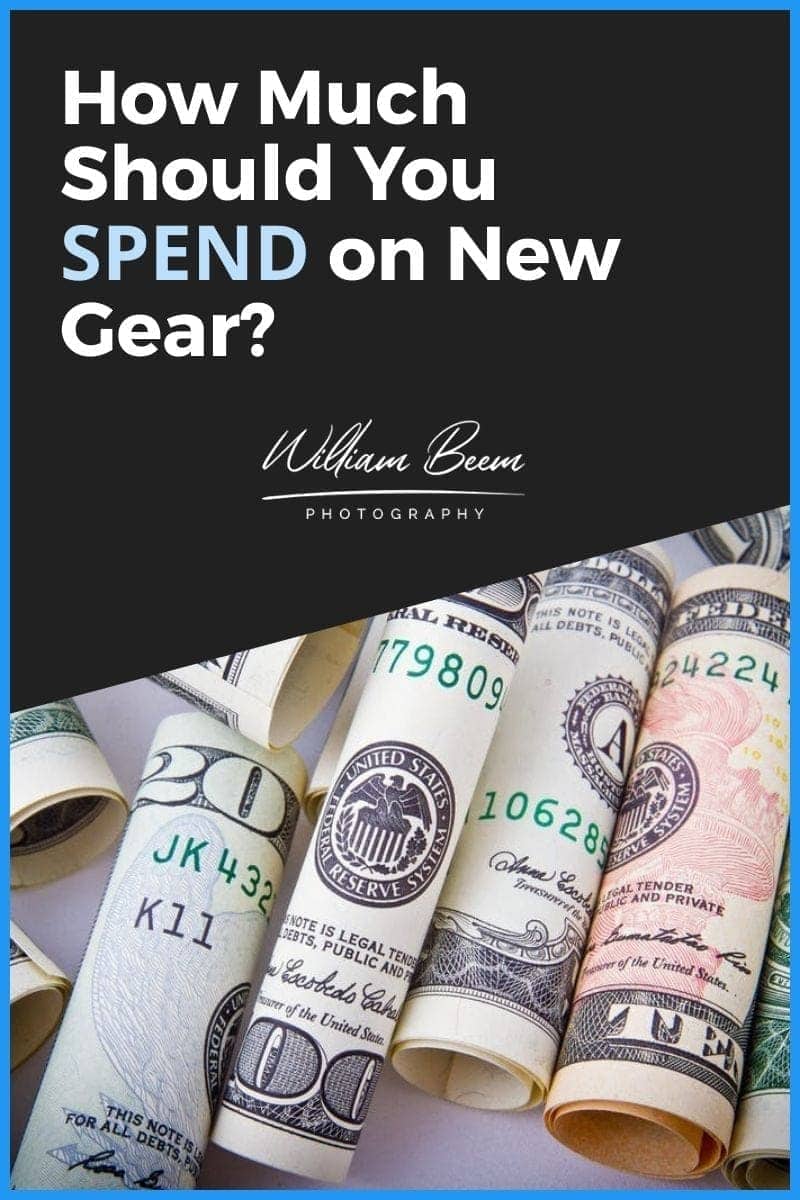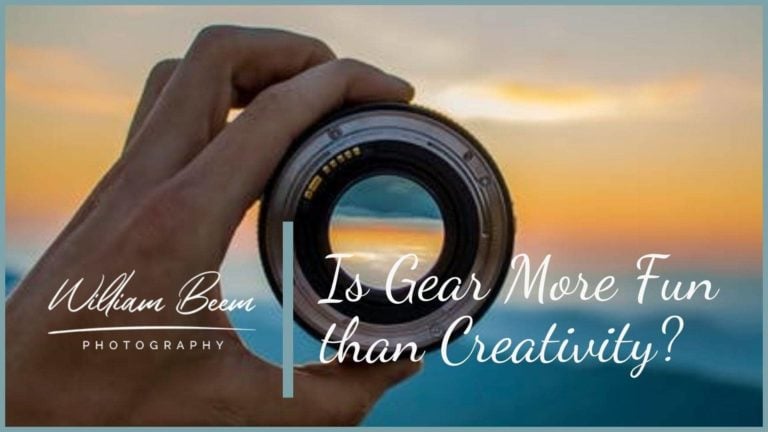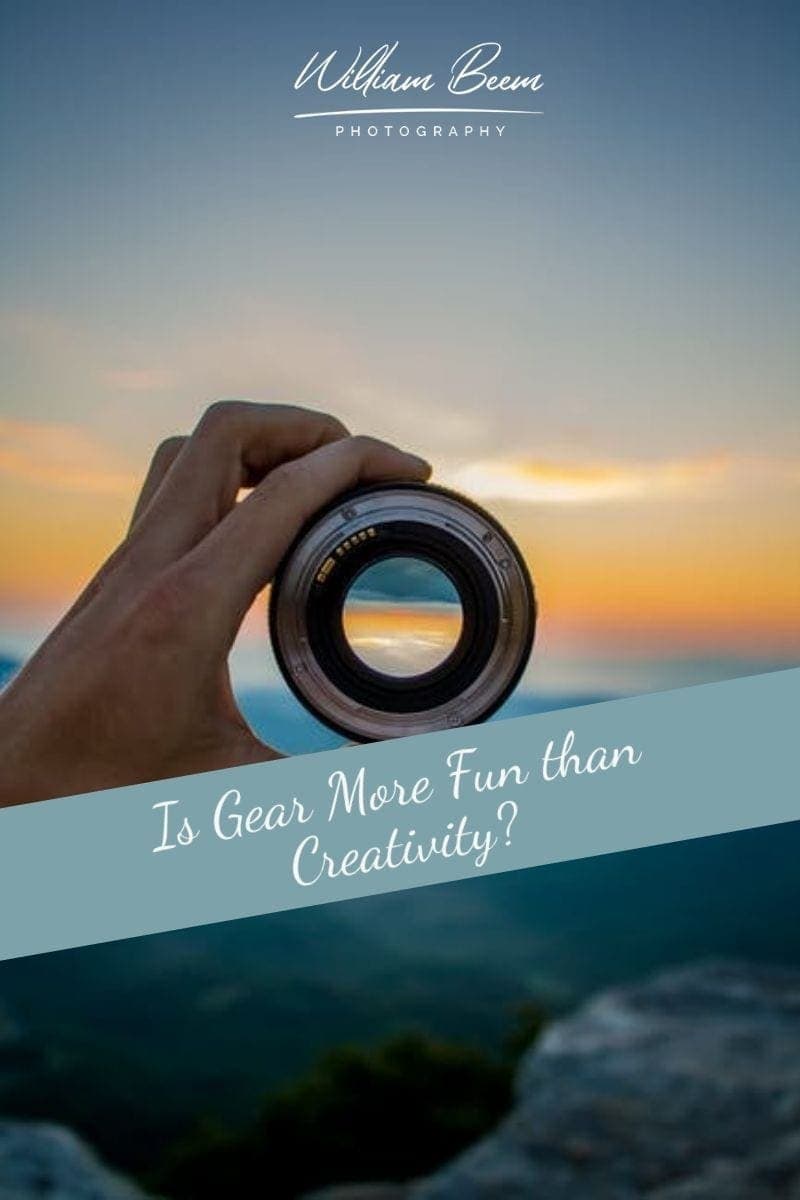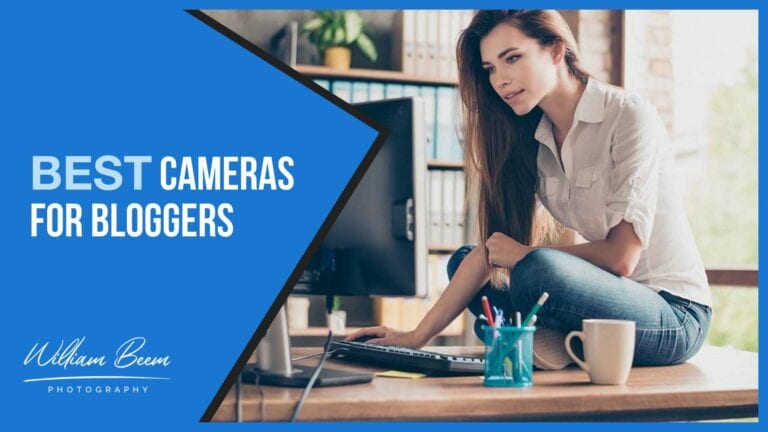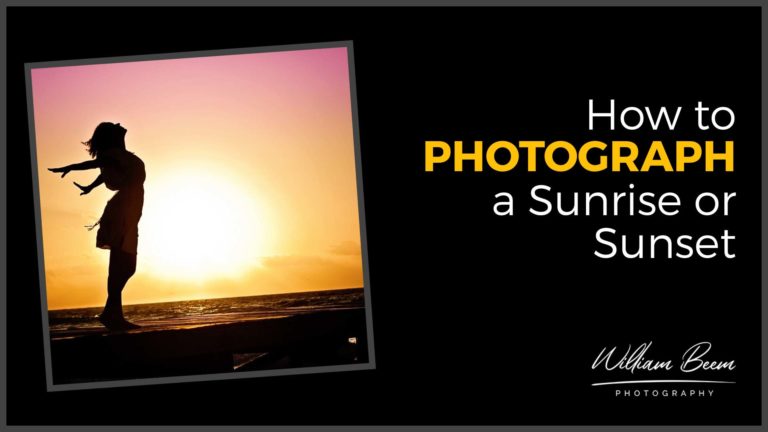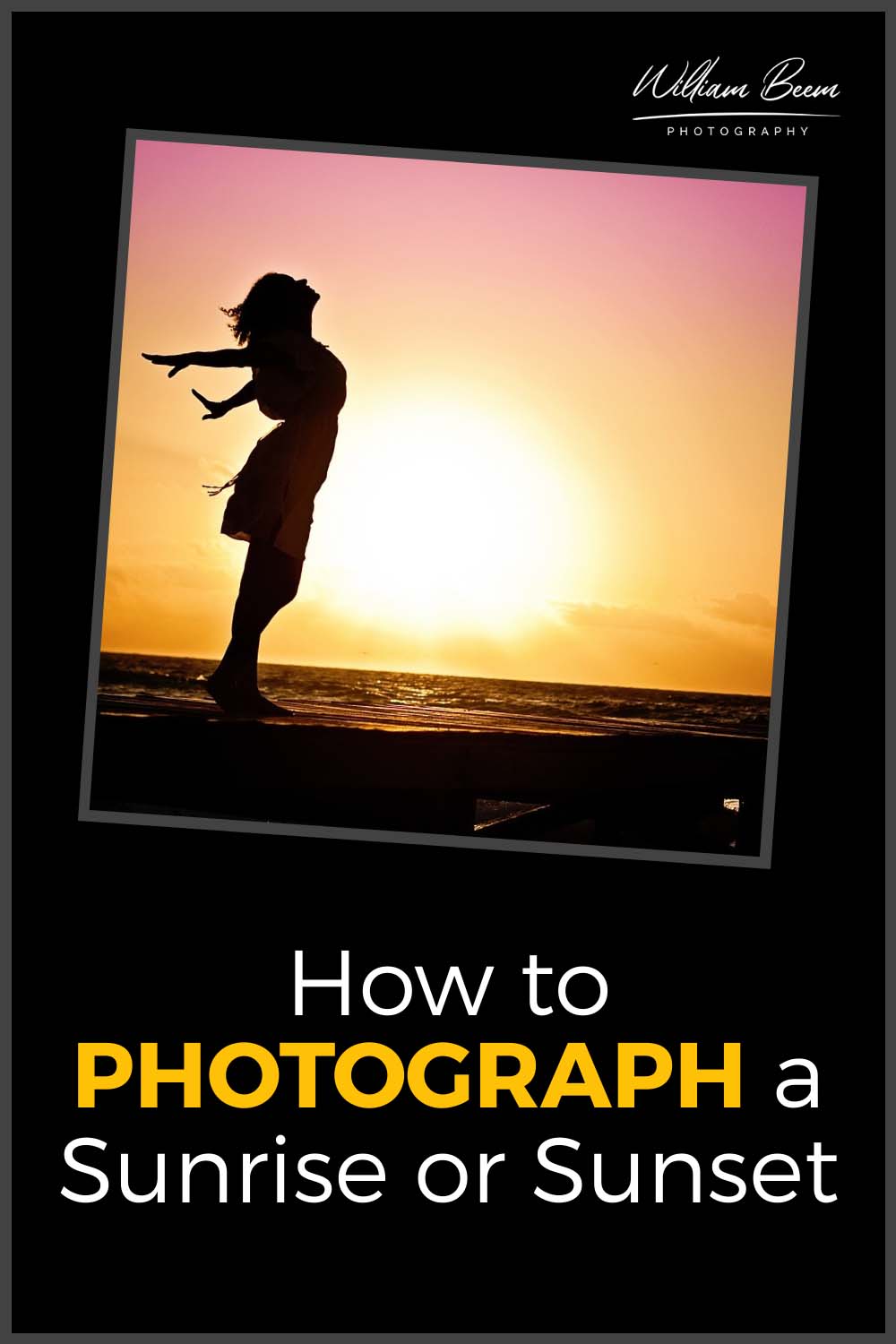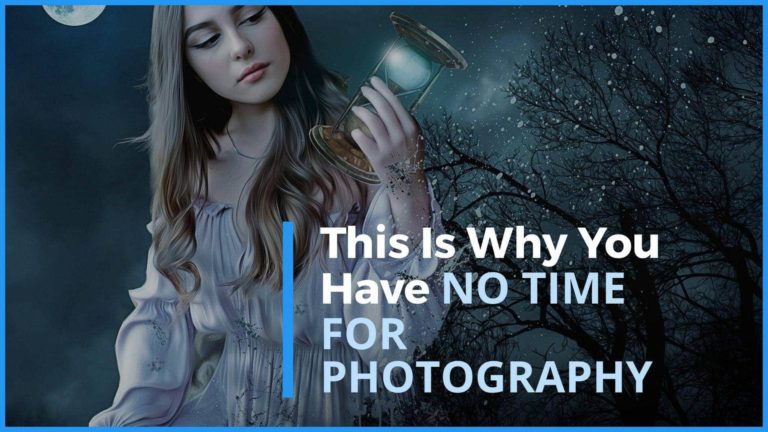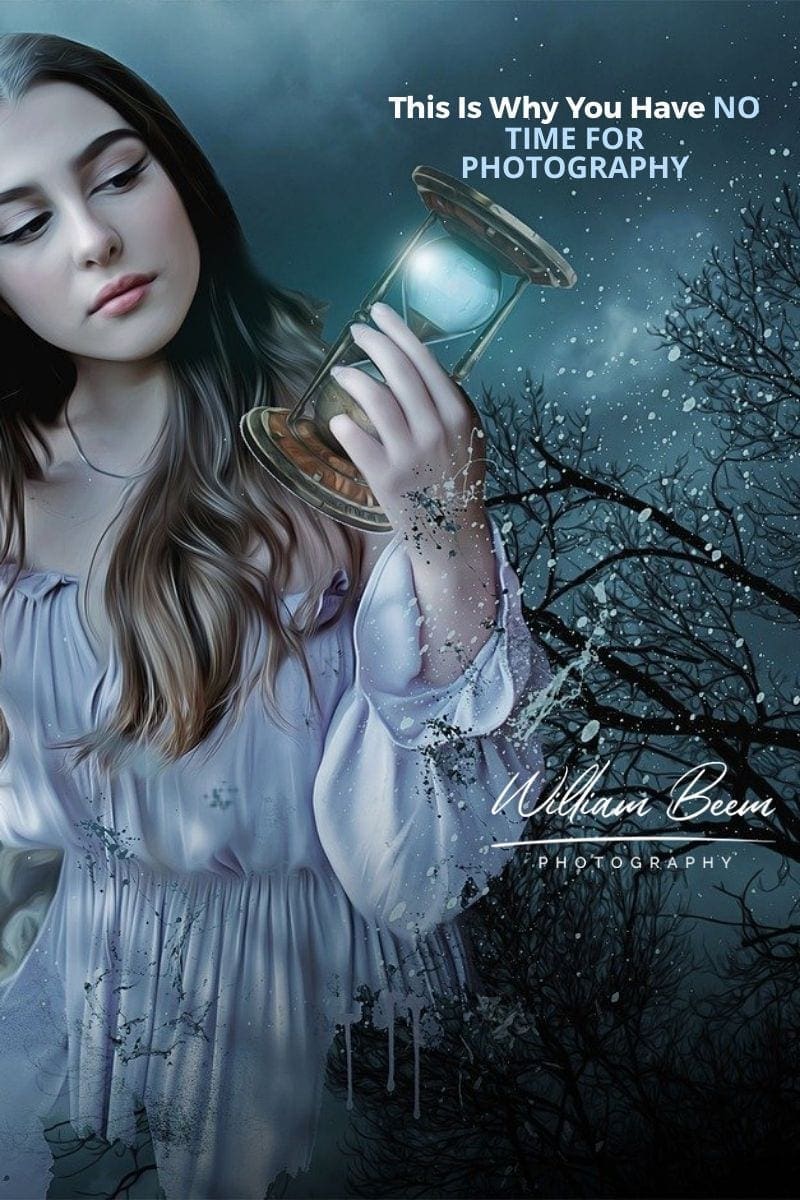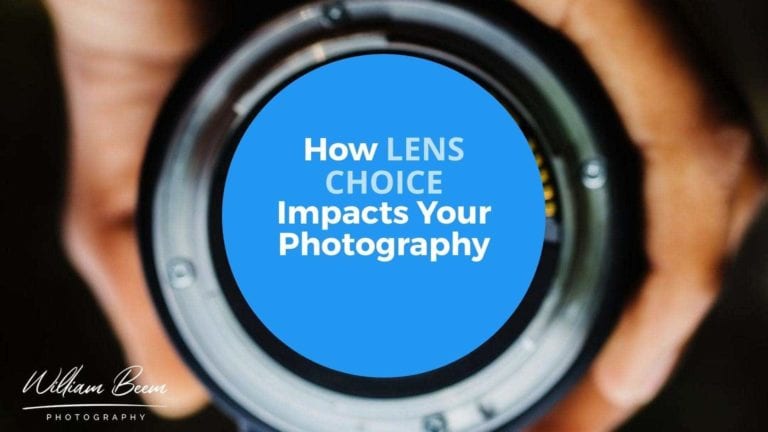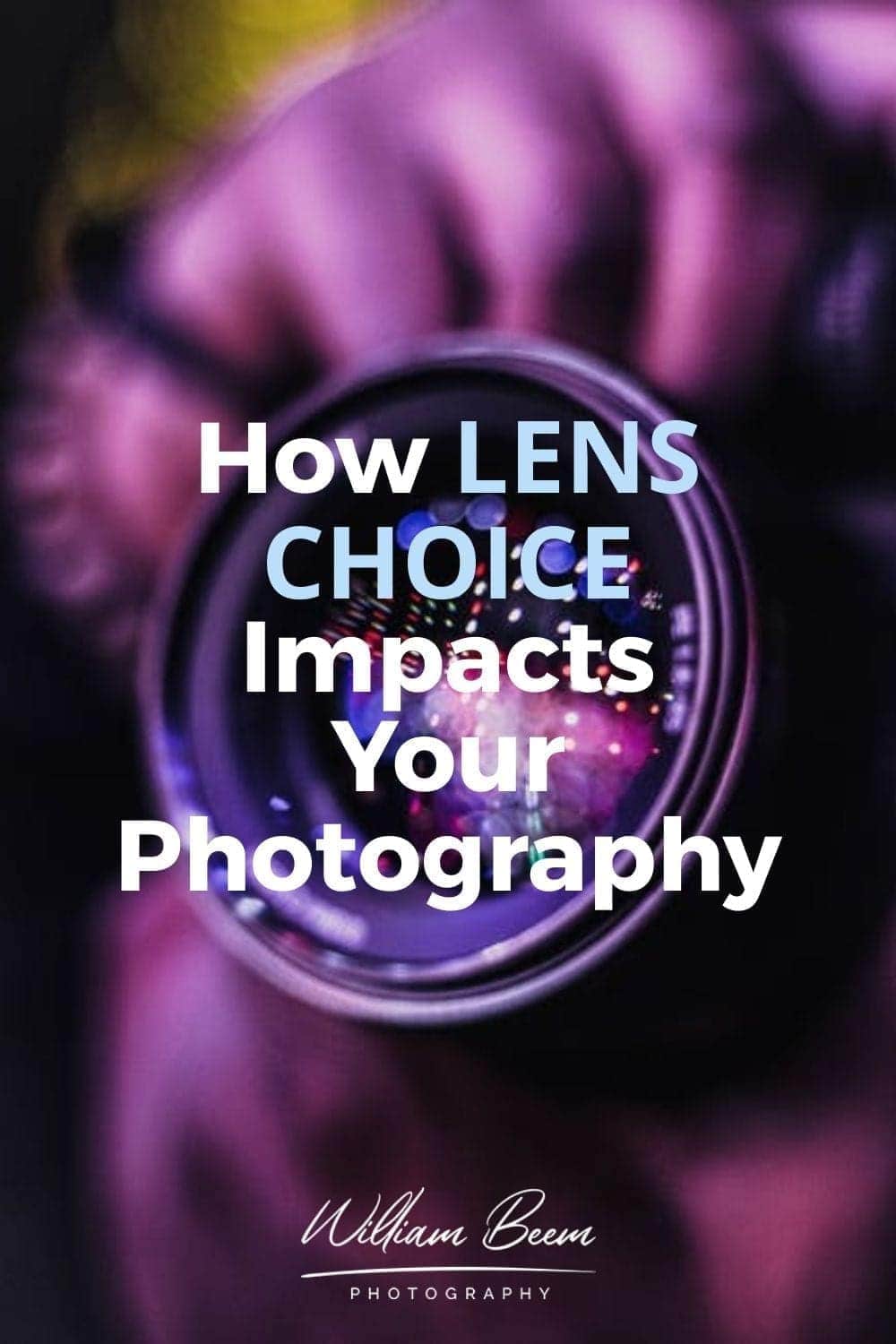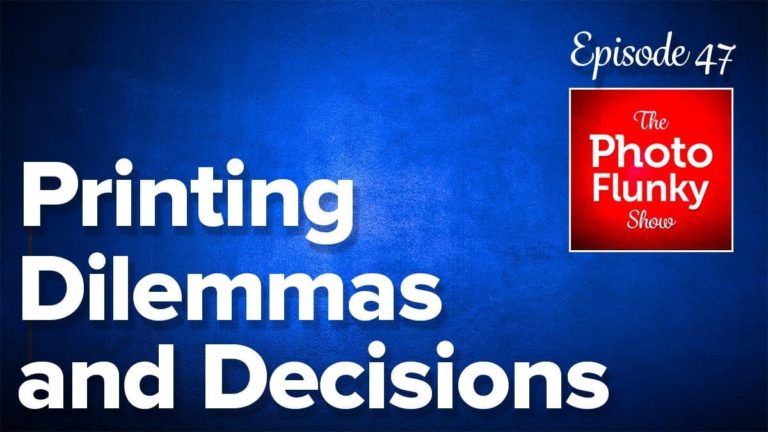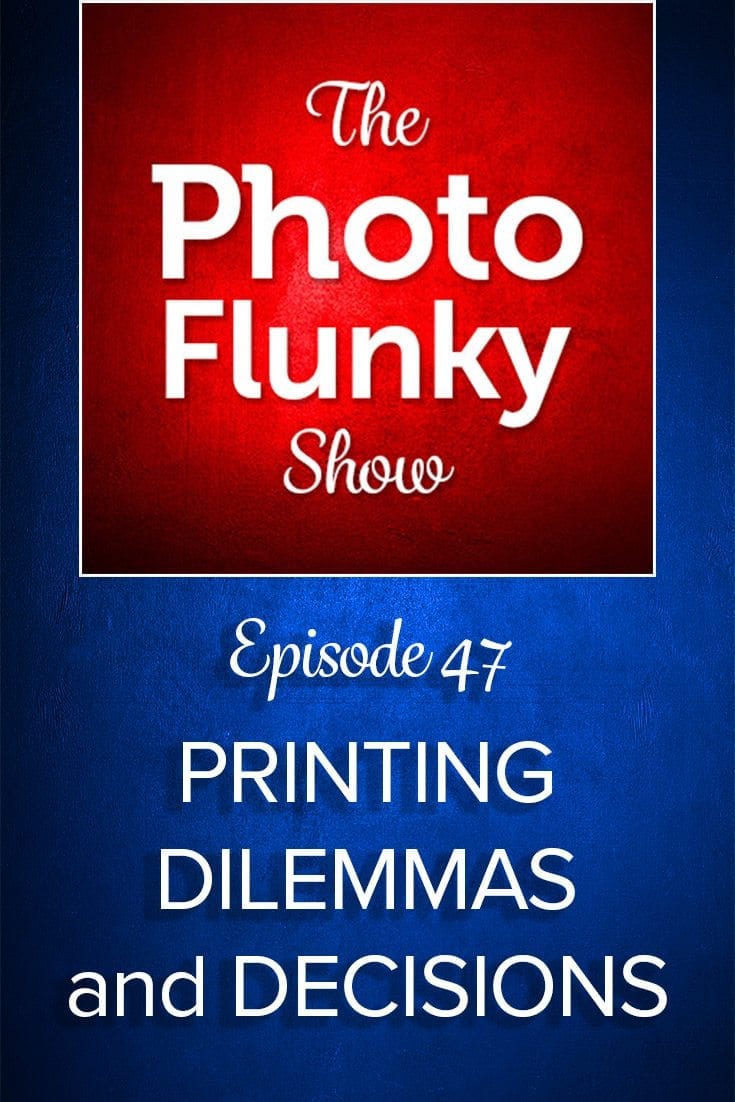Affiliate Disclosure: We earn a commission if you purchase through one of our links at no additional cost to you.
In this episode, we discuss how much should you spend on new photography gear.
Of course, no single answer fits every situation. That’s why we discuss some of my old advice and results, and how I’ve learned to change what I recommend. No piece of gear will take great photos for you.
Gear is just a tool. If you want great results, understand the tools you need and don’t waste money on things that won’t move the needle for you.
How Much Should You Spend on Gear or Training?
It can be very tempting to buy new gear, particularly in hopes of raising your game – improving your photography. I’ve done it many times myself, and I’ve typically recommended some expensive gear in the past.
Not without merit, either. Sometimes you get what you pay for. Sometimes the most expensive thing you buy is the thing you buy twice.
However, I’ve reconsidered the way I give advice because not all circumstances are identical. Also, the reason to decide how much you spend on gear vary from one person to the next are also different.
Take something in another field as an example. I recently spent a couple thousand dollars on a new guitar, and nearly another thousand on a guitar amp. Does either of those purchases make me a better guitar player?
Not at all.
In fact, I haven’t really played my guitars in 20 years. I suck at guitar right now. I’m literally building back up from the beginning as my fingers remember where to go and how fast to get there.
Why Buy Something Expensive?
When you decide how much to spend on gear, think about a few things.
Can this device do something your current gear can’t do? In many cases, the best way to improve your photography is to build your knowledge, not your camera bag full of gear you don’t truly know how to use.
On the other hand, it’s not my place to tell you not to spend money on something if you just want it, and obviously can afford it. It’s fun to buy nice things if you can do it.
I already have half a dozen guitars and four or five amps. The reason I bought the new stuff is because I want it.
Also, my past experience gives me an appreciation of how I want to rebuild myself as a guitar player. I have a specific tone and style in mind. This new gear will achieve that tone, and having it gives me incentive to practice and grow in the direction I want.
In other words, the guitar and amp are just dedicated tools to obtain a result that I want.
But yeah, I still think they’re cool.
Spend your money with a result in mind, and don’t fall for the hype about a specific lens or other piece of gear. Keep your eye on your results.
Time Stamps
Lee was talking to me the other day and she observed something that's different about me. She said, you know what? You don't tell people to spend as much money as you used to. And she's got a story that she's going to share with it. But what we want to talk about is how much should you spend on gear? And that's what we're going to talk about today on I Like Your Picture.
I'm William Beem welcome to I Like Your Picture, the show that helps you improve your photography with visual storytelling. What is visual storytelling? It's a method of approaching your photography with a knowledge of who you're trying to serve with your photos and what emotion you want to make them feel. We encourage you to concentrate on your subject, light and background to create a photo.
Your audience loves I'm glad you found us. Hi, my name is William Beem and my name is Lee Beem. And before we get started, I want to let you know that I've got some free eBooks and also some free Lightroom brushes, you know, adjustment brushes for portraits. If you go to Williambeem.com/courses, you can get any of these things that they're not all courses.
The eBooks obviously are just kind of put in the place where the courses are, because it's easy to download that way. All you have to do is sign up and register on the site. There's a blue button at the top says, sign up. If you register on that, then you can go get any one of those four eBooks or the Lightroom portrait adjustment brushes,
which comes with a free little mini course, a video course on how to use them. So if that's interesting to you, please go ahead, go to Williambeem.com/courses. We've got three things that we want you to be able to take away from this. Expensive gear doesn't mean you get great photos. Sometimes you get what you pay for, and sometimes not,
and it may be worth buying the same thing more than once. And I know that sounds a little strange, but we'll go over all of that in this episode. But first this all came about because Lee was reminding me of something before we were married, we were living apart from each other by an ocean. And she came to me and asked me about buying a tripod.
Lee tell them your tripod story. I had saved up and I had a budget and I was looking at the top end of my budget. And I troll through reviews. And I asked, which of these two would you say is the better one? And your answer was none of them. Basically, he told me they were a cheap crap and then showed me the one I should think about getting,
which was his one. Which mine costs a few hundred pounds, maybe $400 or so his was what? Like $2,500. I don't know it. That machine is probably a thousand. And then yeah, It was in the mid two thousands. Yeah. Okay. Yeah. So that was the other thing. At least my tripod, when I got the tripod,
everything came with it. His, you still had to buy all the necessary parts to make it work separately. It took me months. I decided not to buy a tripod because I was convinced. Yeah, pretty much the message that I got was, well, you're going to get what you pay for. And basically what you're buying is crap. And that's really how I felt about it.
I ended up buying a tripod. I ended up spending a little less than what I was planning to do because I figured if I couldn't afford it and I was going to buy a crap tripod, I just need to make sure it does the job. So I didn't spend as much as I was going to in the first place, but I didn't have $2,000 to drop on a tripod that I didn't do a lot of tripod photography.
It was really for fireworks and some nights, city lights and things. That's just what kind of person I am. You asked me a question, I'll give you my answer. So that works best for me. Look, this came back from an article that Tom Hogan wrote. I'll have a link to that in the show notes. And the idea was buy quality.
So you don't end up having to buy the same thing over and over again. There are certain things you look for in a tripod. You obviously want stability. You don't want it to be too heavy that you don't feel like taking it out with you. Yeah. There are elements of a tripod that will affect the weight and the stability. So for example,
the one that I was recommending was a carbon fiber tripod, lightweight, and very rigid. At the time, you didn't have less expensive carbon fiber tripods as you do today. Yeah, that's true. The other thing I was talking about was there's this little center column, you know, it's a riser. The higher you elevate your camera on that thing,
the less stability you have, the more it's prone to get vibrations on it, which means you're losing the purpose of a tripod, which is to have a stable platform. So you get a good, clear shot. So the ones that Lee was looking at where these basically cheap little things, and I know because I've bought the same things before and I've,
I've got them in the garage and they weren't really stable. So some of them were lightweight and they could be flimsy when you set it up. And some of them were heavy and sturdy, but they're so heavy. No, she's only a third of my size. Yeah. But you know what? You're correct. And I knew that at the time I did do my research,
the first thing I wanted to find was that the tripod was going to be able to handle at least double the capacity of the current camera body I had at the time. Plus the heaviest lens I had at the time. I thought that gave me some wiggle room. I wanted something sturdy. So I did troll through very carefully through extensive reviews on different sites.
So when it's to see what people said about them, the good, the bad and the ugly. I knew that one of the trade-offs I would have to make, because stability was important was the weight. I did suck it up. I used to carry a really heavy tripod around with me. I actually made straps to attach it to the side of my backpack because I think it probably wouldn't have held in the ones that were made on the original backpack that I had.
But you know what, that was a trade off. And that is something, you know, I didn't have an extra thousand pounds to drop so that it didn't have such a heavy tripod, scary, especially considering this isn't something I did all day, every day. This was like once in a while kind of thing. And that was something else I considered.
Okay. I've said often that photography involves compromise. And one of the things I didn't consider when I was giving her this advice was the difference between my lifestyle and her lifestyle. She was working a job that wasn't paying as much as mine. She had a child to consider as well. And you went off like did fireworks and maybe some stuff with your brother every once in a while.
Whereas I was single with a very well paying job and I can afford to buy what I want. And also I blame my mother because look, this is how my mother buys things. She walks into a store and let's say she wanted to buy a lawn mower. And this is a true story. All she does say, what's your most expensive lawnmower?
And they said, well, that John Deere model right over there, and the guy starts to talk about all this features and benefits. And she says, I'll take it. Yeah. And that's how I learned how to buy, just walk in and get the most expensive thing. Yeah. What is he the best value I can get from my money?
And then I want to see how many coupons I can stack. And I want to see how many loopholes there are in the coupon rules for stacking so that I can jump in. All right. And I don't want to go into this story right now, but this, what she just said comes from a woman who not only got her DSLR for free,
they paid her a couple hundred bucks to take it. Yes. And I think we've told this story before. Yeah. They, they were insisting that I had paid for it. No saying, I know you sent me a receipt, but you haven't billed my card. And they got quite testy about it. Cause I kept writing. I was thinking,
man, I don't want to be held up for like, it's almost like shoplifting. I, you know, I paid, they'd given me a receipt. We told her to get lost, but they gave her a couple of hundred bucks. Well, that was because there was a rebate thing going on that camera body. So I got 200 bucks from Nikon,
which I had. Yeah. How the two of us got married is really, I don't know how we got Married. Yes, you were. I've never dated a woman before who, who ever wanted inexpensive lifestyle. Look, here's, here's the point. I've spent a lot of money on gear and it's good high quality gear. And then I don't use all of it.
I find that I used just a few pieces and then I also found that it's not necessarily the gear that always makes the difference in my photography. I've kind of come back to this with, let's say off camera flash. There are people who like Profoto I used to have Elinchrom. And then now I'm using Flashpoint, which is the Adorama branded version of Godox flashes.
I love these little Flashpoint things. They're wonderful. So were my Elinchrom. Just the only problem with my Elinchrom problems was, one, I had to plug them into power and I ended up buying this big car battery kind of thing. So I could plug it into power and yet use them outside of the house. And two, they did not have any smaller flashes.
So I went through this convoluted process of buying Pocket Wizards to put on the flashes and the strobes so that I could use them in conjunction. And it was just a big, expensive mess. Whereas now I've got one trigger that can control five different Godox or Flashpoint lights. And just occurred to me like you don't have to buy the most expensive thing. You know what the difference is between a Profoto light and a Flashpoint light?
The price and the user interface. And that's it. It's like you're paying a lot of money for that Profoto name. It has a brilliant user interface, but the quality of the light is the same. In fact, I've seen tests where you had better color quality coming from the Flashpoint light than you did the Profoto light. Buying the most expensive thing isn't necessarily,
what's going to make your photos better. And that's kind of really what we wanted to talk about is that expensive gear doesn't mean you get great photos. I'm not saying go and buy the cheapest thing out there. There's a lot of truth in the saying, The most expensive thing you buy is the thing you buy twice. Oh, this is the tripod.
Because with our two tripods, I could have bought a 10 times before we broke even. But I tend to look at what it is, you know? Cause I've got certain things where I know you get third party, great quality things that are repeatable, but I just for some reason it's my own comfort level. I've never bought a third party battery and always have a spare battery for my camera.
It's the same with the charger. And there's certain things like from buying a spare lens cap, buy the cheapest thing. I don't care where it comes from. If it clips on there and it works. I don't care. There's certain things. I think we've all got our little things where we go, you know what, I'm just more comfortable with that.
And those are the things where I'll pay full price and get the genuine product. I did that with Nikon flashes, you know, I bought the SB 600, the 800, the 900, the 910. These are like $600 flashes or more at the time that they came out. They've they've long since been replaced. Now I can go get a Godox or a Flashpoint flash that's equivalent in,
in some ways, even better because it uses the lithium ion battery. That's easy to recharge and has more pops for like under $200 that, Hey third-party makes sense. Not only that it has a radio trigger rather than those Nikon flashes. I was talking about used their CLS system called creative lighting system, I think. And it was a line of sight optical system.
So in other words, you couldn't hide a flash around a corner someplace and have it fire. So I've got a cheaper $200 flash, less than $200 flash from Godox that outperformed the $600, $700 flash I got from Nikon. I paid 30 bucks for my, yeah. Guess, guess which flash I'm going to choose. And there are people who've also bought the YongNuo flashes and it was an insight not,
I can't remember all the different names. In other words, there are less expensive flashes out there that do the same thing as the expensive ones. Do they put out a burst of white light. Wow. Why are you going to end up spending more money on something? Because it has a brand name. If it does a good job and has a good reputation... Again,
it depends what it is. The reason I got mine so much cheaper was because that was, you know, in the good old days, when you could walk into camera stores and they were, you know, you walk into a city, you're going to come across the camera store. You walk in there and sometimes they'd have display models of stuff. It's been out on display.
It's all fingerprint to them. Maybe they didn't know where the box and the instructions are. I would haggle with them, but that's actually how I got my, my flash. I was looking at buying a third party one. The guy was very helpful in the camera store. And if he had something on sale and then he said, well, our we've got these.
He said, look, he said I'd sell you this one, but there's no boxes, no instructions. They'll said, well, make an offer. And he did. He said, look, we're replacing the display next week. We've got a different, you know, something else that's coming in. So those I'll buy it as is. So I got it for,
I haven't seen him out 40 bucks, then they were selling it for like 160 or something like that. So again, it wasn't an expensive flash. Yeah. Walked away with it for a small change. Now a flash with the scratches on the little plastic diffuser thing doesn't really matter. And it worked absolutely fine. It got damaged because it had an accident at Disney World.
What was the accident? Somebody ran into me and knocked it and it fell on the ground. It kind of still worked, but it was temperamental after that. And afterwards it was just so unreliable. I think it was the battery compartment. Like it just things weren't connecting properly anymore. I think I've still got it. It genuinely was an accident. Somebody got bumped and fell.
I think one of the other mistakes that a lot of people make with their budget is feeling compelled to upgrade when what they have is already working. There, there are reasons to upgrade. So for example, the MacBook pro I've got now, I think it's 2014. The one I had before was like four years old. It was working fine. The problem is the ports on it had been outdated.
So in other words, Apple used to have this thing called FireWire and it was supposed to go to blazing fast speed of like 400 megabits per second. And I thought, well, at the time, that was fast. But now I have these Thunderbolt things that go at, you know, up to 10 times as fast as that and the computer while it was doing what I needed to do,
I just couldn't get the data in and out fast enough. So I ended up replacing that. But the one I've got now, like I said, it's 2014, this is 2020. So that one is six years old. The same thing with my camera. My camera is a Nikon D800. That was released in 2012. That's I've got an eight year old camera I don't have for my regular photography.
I don't have a mirrorless camera. I've got one that I use for my YouTube for, for a videos and things and I like it. It's really nice. It's got some nice features on it. When I'm ready to go replace this D800, I will probably go with one of the Nikon mirrorless cameras, but I don't have to. I can still take nice,
great photos with this old camera. It's 36 megapixels. So I've got plenty of resolution for it. Yeah, I would think, I think mine is actually a little bit older than yours and I'm very happy with my camera. I have no need to change it. I love my DSLR. I know people do like the convenience of something smaller and lighter.
But if I really want to take photos of what I feel my camera, and I think this is where it just becomes a very personal experience. You kind of like people get attached to their car or their bed or whatever it is, their favorite spot on the couch. I mean, my camera's just, I love my camera. I'm comfortable with it.
I know it's, there's nothing that another camera body is going to do for me to change the Results. The concept's been the same ever since, you know, the first camera came out. You've got shutter speed. You've got aperture size. And then you've got ISO, your sensitivity to the amount of light that's coming in. A mirrorless camera is not going to do the final result of a photo,
any different than the camera that I've got. Now, there are things that mirrorless cameras do that mine don't, you know, you can see what your photo is going to look like. As far as the lighting, before you ever press the shutter. That's a handy little feature. There are little wireless things that let you, you know, instantly transfer your photo to your phone and,
and so forth. All those are are nice to have, but the core function of a camera is the same. You're taking a picture with ISO, aperture and shutter speed. Yeah. The idea that I'm going to take a better picture with a newer camera is really just nonsense. Unless I need some technological trick for some complex shop that you know, the older camera doesn't have.
I just don't feel like I'm compelled that I've got to go upgrade right away. I'll take photos with this camera as long as it's good. My camera before that was a D700, also full frame. The only thing about that one that concerns me a little bit is it was 12 megapixels, which is kind of small by today's standards, but still perfectly fine for anything that you want to print.
I'd say up to 24 by 36. Yeah. I mean, I did big, I flew up to fairly big prints with my D90. So we're going back now. I believe that was a 6.1. Megapixel megapixel. Yeah. So I've got a camera and I've got a backup camera. That's that's really, what's important is I've got something to take pictures.
And if that breaks or somehow no longer works, I've got a backup camera. And that for me is plenty enough of what I need to do. I don't have a backup camera. I've got my main camera and then I've got a foul mouth for if something goes wrong, You have your iPhone. You, you like your iPhone. The idea is that don't get hung up on the gear.
There's a phrase called gear acquisition syndrome. You might see it listed sometimes as gas and another phrase called lens. The lust I gave into lens lust. There are two Nikon lens Trinities, they called them. For the zoom lenses. That was the 14 to 24, the 24 to 70 and the 70 to 200. So I've got all of those. And then for the prime lenses,
there's the 24 millimeter, the 35 millimeter and the 85 millimeter. Guess which of these lenses I use and guess which ones I don't use. For me, the 24 to 70 and the 70 to 200 cover the range of 99% of everything that I want to do. And I tend to use the, you like the 35 millimeter prime. And I have used the 14 to 24. When I did my tour of the Capitol in DC.
All I took was the 14 to 24, and I'm really happy with those photos. When I look at the other primes, I've got a few shots of portraits with 85 millimeter, but you know what? I bought that because of the bokeh that it gets. Well, if you take the 70 to 200 and you rack it out to 200 millimeters, you get bokeh
that's just as good. It's a different focal length. You're going to have a little bit different with the idea of compression, but that bokeh is right there. So I don't necessarily need to take off, you know, one lens and put on another to get that feature. And the 24 millimeter, I don't, I don't really use it. Focal length just by the way,
is the 50. I know everyone goes for the 35, but if your 35 was the 50 millimeter focal length, I think that would be my match made in heaven with the lens. Well, maybe I'll sell the 24 and get you a 50. I've got the cheap little nifty 50, you know, the, Well actually I've got one of the really like,
it's, it's so old, but it's really good. It's look, it's not a sharp, super sharp lens by any stretch of the imagination. But the manual focus is actually really good. Auto focus are fine on that one. It's not always quite spot on, but if you're, if you've got the time to manual focus, I love my 50.
Now, do you ever investigate with like third party lenses though? I have. And I actually loved the lens. I had a couple of Tokina lenses. When I was shooting crop sensor, I had a Tokina 12 to 24. That thing was it, it seemed like a copy of the Nikon. One only had half the price and it was fantastic. Had the better one.
I had the 11 to 16, that one. Do you know what happened to me with that? I was going to rent it. I realized that I thought I have this great idea that maybe if I bought it, used it and sold it afterwards, that actually it would cost me less than renting it. And I wouldn't have to mess around with insurance and all the rest and liability charges.
So I did that. Do you know that lens, which is so sharp and I loved it so much. What happened was I bought it for a specific purpose. It's not the type of photos they usually take. I'm typically not a wide angle person. And I hang on to it for two years. I loved the quality of the photos so much that I tried to make myself find a way to use the lens.
By the time I sold it, the newer models had come out. And so of course the price had dropped. I didn't lose, yeah, I did actually some money on it, but I mean, I got a lot of enjoyment out of it. But I was thrilled with that lens. And I also had the 12 to something. There was another one that they had.
I rented the fisheye. That is my most coveted lenses of everything that I don't own. When I was crop sensor, I had a D200, I had the Nikon, I think it's a 10 and a half millimeter fisheye. Absolutely wonderful. That is a fun lens. I was fun when I was doing travel photography. Doing portraits, not quite as much fun.
Yeah. See you do portraits. I do different things and I could probably still have some fun with something like that. Yeah. But the idea that we're talking about is that it's not necessarily how much you spend on something that makes it valuable to you and value is what we're really getting at. So one of the things I mentioned that may be worth buying the same thing more than once,
and Lee sort of alluded to this with a tripod. She said she could buy the same tripod multiple times for the price of the one that I recommended to her. Yeah. That's where it comes down to how you personally use it. And also, what do you, what are you doing with your photos? I was going on as a hobby. My camera's also a lot lighter than your camera is,
you know, my view was, look, if it does get messed up, if it is on a long haul flight and it gets damaged. Cause I used to put it in with my checked bag. I mean, that was, I wasn't gonna carry this in on the plane. So I'd put it in with the check bag and I kind of felt like it wasn't going to kill me if I had to go and replace it.
Ultimately I expect that there probably would. To me, the trade-off and carrying something heavier was, you know, it's not an everyday thing. And usually when I was using a tripod outside of going away for a special trip, it was inside the house for a still life. So it didn't matter if it was heavy. All right, I'm going to ask you a question and you're definitely the wrong person to ask this question to,
since you had your camera for free, when is it worth buying something expensive? That's quality built to last and you know, you want that versus getting something less expensive than you may have to buy a few times. Okay. So the camera body is an example. And honestly, when I bought this, I had every intention of paying for my camera.
I have the money there. I mean, I wasn't trying to get anything for free. And I did try, come on this, Tell me your thought process. Why is something worth buying to keep versus just buying to use for a while? And it's inexpensive and you can replace it with something else? I think when you're committed to something, it's a psychological thing.
This is just my view that maybe some people aren't aware of, but I've caught myself with it before where sometimes my reluctance to go all in for something is because I'm afraid that I feel like I've committed myself and I'm not quite cheerful. And they give that full commitment once I've gone all in. So I kind of sometimes see spending, you know, like increasing the budget,
maybe pushing a little bit, maybe you have to save for a while. You have to pay something off. I do see that as a much bigger commitment than just going and getting something a well, you know, hopefully I use it. For example, I want the body of my camera to work. If I'm buying a lens and it's going to be my main lens,
like for example, the, you know, with your 70-200 or your 24 to 70, let's take the 24 to 70. That's kind of a multipurpose lens. You can cover a range of activities with that for everyday and specific use. It's a really high quality lens. To me that is something worth investing in and saving up for the lens. You can use it even if you do change your camera body.
So there are certain things where you can commit to it. And even if you change your mind on other things, it's still good. You know, the value continues. Commitment is definitely one of the issues that you need to think of. I often hear sports photographers, you know, get questions from people who want to get into it. And they say,
well, I've got a 70 to 200 and you're shooting football. Well, that's just not going to cut it. Those guys are out there with a 500 or 600 millimeter lens. And sometimes with a tele extender on top of that as well, depending on what they're shooting. And they'll tell you this, this little line is like, did anyone ever tell you that photography was an inexpensive hobby?
It depends. Is photography a hobby or is photography a business for you? If you want to get into that kind of sports photography, if you want to get into wildlife photography, you need those longer lenses. So that you're out of the way of the action. And you know, one the football or basketball game, you need that so that you don't get hit by the players. With wildlife,
you need it so that the bear doesn't eat your face. The idea is that's an incredibly expensive lens to get. What do you do? You had never had one. You go rent first. Yeah. Make sure that here we'll make sure it's comfortable. Cause sometimes you have, you know, I've tried out some gear that I thought know this was great for a once-off,
but there are little things that you notice notice... In every day, this might be a problem. I was thinking more about the commitment. Like you mentioned, because when you start getting a 500 or 600 millimeter lens, that is an incredibly expensive lens. So that's going to be a commitment. How often are you going to use it? Some people who are wildlife photographers are out there multiple times a year using it.
Other people are, you know, retired doctors or dentists or, you know, whatever field you may have been in. And you, you get it because you can afford to do it. And you might want to use it two or three times a year to go on a workshop and take pictures of bears or other wildlife. The budget is part of it.
If you can afford something fine, go get it. I would not be the person to tell you to not to spend money on the things that you want when you can clearly afford them. And it's not affecting any other part of your life. And if you don't like it, you can turn around and sell it. Yeah, I'd say for most of us that we do have a budget and we need to live within our means.
And we need to understand that what we're spending money on is going to provide us with value. And that value can just be the fact that it's satisfaction, you know, satisfaction of having it and using it when you need it. I get that. But if you're talking about stuff that you use, is it really something that you need or is it just something that you want?
See, I think both are equally justifiable. They are, but I've wanted things that I haven't used. And now later on, I'm thinking, why did I buy that? Oh, you bought it. Cause you could. I did, you know, before I was married, I had money. Now he's got a wife. But do you know what?
There's nothing wrong with that. I mean, I think that's the important distinction to me here. Unless you setting, trying to figure out what the trade off is, you know, what, what do you have to give up? Or what do you have to wait for by spending the extra money? I think if that's doesn't feature in it, even if you work for your,
your money and it's there, I think people should get to spend it as they please. This message isn't really for people where it doesn't really matter how much they spend. But I think for most of us, you get to a level where there's something you look at that you go, okay, this is the, now we got to work to a budget.
I want to go through the takeaways. I said expensive year doesn't mean you get great photos. And quite honestly, this means that if you're not creative, if you're don't have a good eye for composition, if you don't have a good eye for color, you might just come away with snapshots. Some education, some time spent on yourself as an artist is going to help you more than buying a new piece of gear.
Well gear doesn't create art. The artist does. No, gear is a tool. I love my tools. I'm really happy with the tools that I have, but they are not going to take the picture for me. Whether you're a landscape or a travel photographer. You're doing fashion or some kind of portraits, you like wildlife. You've got to have that eye for composition. And it takes time and practice.
I'm not suggesting that you can't do it because you've never done it. Nobody's born with that eye. Well, maybe Lee is, but I'm not. I have to go. I have to spend my time and practice and go learn what makes a good composition, what makes a good photograph. And I do that by looking at other photographs and studying and getting some education on how to take better photographs in the style that I want. To me,
that education is worth more than buying another device that maybe I'm not using correctly to get the photos that I want. The idea that expensive gear doesn't mean you get great photos, is that it depends on how much you know about how to use it to create the photos that you want. Yeah. So when I say sometimes you'd get what you pay for sometimes not. Think about the flashes that I talked about.
Those Nikons flashes that cost me between $600 and $700. do no better than the one that cost me less than $200. So the idea that buying the more expensive flash is going to give me a better Results? Not true. Well, the tripod you've got is definitely better than the one that I have. And there's, there's no debating that. I mean,
that was never up for, for argument. That tripod that I have in the ball head that I have to go with it. It's a Really Right Stuff, tripod and, I think it's TVC-33 is one of them in there. There's another one that I bought from them. And also the ball had, I think was BH-44, in case you're curious about them.
Those things are going to last me a lifetime. I got the really wrong stuff because it fits my personality. I know you've got my leftovers and she's happy with my leftovers because all she does is take photographs over, you know, tabletop stuff. And then occasionally we'll go out and take fireworks photos. Yeah. But she's happy with that. And the other point is like,
it, it may be worth buying the same thing more than once. So for example, I I've talked about that Tripod is really expensive, but if you're not going to use a tripod, the way I use mine, you know, maybe it's every now and then kind of thing, why spend the money on it? I wouldn't recommend investing on something that isn't going to give you value in return because you don't need it.
Well, and similarly with the one that I've got, it's nothing at all comparable to the one that you have. Having said that I expect that the one that I'm using now will also last me a lifetime. My camera's not as heavy. It's not getting dragged around. There might be an occasional trip out, but the way that I use it, my appropriately using it,
I don't expect to ever have to get another tripod. There are so many different types of gear that we mentioned and more that we haven't mentioned, you know, I haven't even talked about our light stands and backdrops and other things like that. I like buying quality, but I've gotten to the point now that I don't recommend buying as many things as I've bought myself,
because I've spent thousands of dollars on things that are sitting around not being used. I don't want you to make that same mistake in your life. Thank you so much for joining us on I Like Your Picture. This is episode 243. So you'll find show notes available williambeem.com/episode243. And just a reminder, if you'd like to get some free eBooks and a Lightroom course and brushes,
please go to Williambeem.com/courses, and you find some free stuff there. All you have to do is click the blue button to sign up and then you've got access to everything there. And plus I'll have new courses coming out, some paid some free. So please go ahead and take a look at that. And we will see you here again next week.
Related Links
I mentioned on the podcast that I would link to an article by Thom Hogan about his advice to buy a tripod. Sadly, I can’t find it. Here are a few articles from my site.

